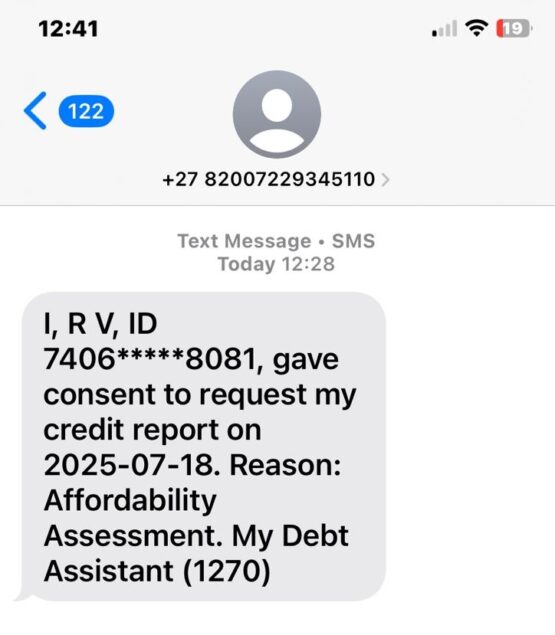When companies can access your financial data illegally without consequence, privacy law is a farce.

Sixteen minutes. That’s how long it took me from receiving a cold call from a woman claiming that I “qualify” for a 60% discount on my monthly loan repayments to being on the verge of being put under debt review.
She never once mentioned the term debt review, however, at the same time, she had access to very personal information, including my ID number, phone number, and home address, and illegally accessed my credit profile.
Had I not interrupted her just as she was about to cancel the mandates on my debit orders and revealed my identity as a journalist, I would have been put under debt review.
The debt review industry is already viewed negatively, but this case study suggests it is fundamentally flawed. The regulations aimed at protecting South Africans are not working.
Through a basic desktop search, I discovered that I was not alone; several other consumers had been placed under debt review without their knowledge, apparently by the same debt counsellor.
But let’s start at the beginning. I have been inundated with unsolicited marketing calls for months. I would sometimes get three calls a day. I always block these numbers afterwards. However, when I received this particular call recently, my phone was hooked up to my computer, and I could record the call.
I decided to humour the call and play along to ascertain what personal information the caller had and where she had obtained it. Big was my surprise.
ALSO READ: Debt Review: The good, the bad and the ugly
This is what happened.
I received an unsolicited call from a woman who identified herself as “Rhadia”. She claimed she was from a company called Smart Group, “a financial company empowered by the NCR (National Credit Regulator), as well as associated with the five major banks in South Africa.” She referred me to the website of My Debt Assistant (www.mdassist.co.za).
Rhadia stated that the call was to inform me “that we did get a request from Capitec Bank that you do qualify for the 60% discount upon the accounts or loans which you are paying for”.
In response to a question about how this is possible, Rhadia responded: “The bank (Capitec) has noticed, sir, that they were overcharging you too much high on the interest rate.” This is despite my not having any retail banking relationship with Capitec.
I then questioned her on how her company would benefit from this offer to reduce my monthly repayments, and she said the company would not benefit at all: “We do not get paid by or through a consumer. We do get paid by the government, as we are associated with the five major banks. We do get paid by the banks as well. You do not pay us on a monthly basis, sir.”
The interaction continued, and it was quickly clear she had all of my relevant personal information. She read my ID number and asked me to confirm the last three digits. Then, the interaction spiralled out of control.

ALSO READ: Debt review: should you or shouldn’t you?
Within seconds, she accessed my credit profile, reciting my monthly payments to the cent without ever asking for my consent. A few minutes after the call, I received an SMS from the credit bureau confirming that My Debt Assistant had accessed my credit report, citing “Affordability Assessment” as the reason. This confirmed that the company was behind the call and served as proof that they had unlawfully accessed my confidential financial information without permission.
Rhadia then claimed that she could reduce my monthly payments by 27%, as well as my outstanding bond and vehicle finance balances by 21%. In both cases, she quoted the amounts by which the actual payments and capital would be reduced.
When pressed again on how this was possible, she stated: “Like I said, sir, we do, they do negotiate with the credit providers to remove the interest rates.”
I asked where she accessed this information, and she responded: “It is on the system, sir.”
The conversation continued until Rhadia stated that she was about to cancel the current debit order mandates on my accounts and that I would receive a schedule of the reduced payments by email. This was 16 minutes into the call, and I then realised she was about to put me in debt review. At that point, I disclosed that I was a journalist to stop the entire process.
When I confronted her about why she had not informed me that she was about to put me under debt review, or even mentioned the term during the conversation, she said she would still explain it. Suddenly, she began experiencing difficulties with the connection, and our call ended.
ALSO READ: Leaving debt review too early could come back to bite you
My Debt Assistant
I started researching the company, My Debt Assistant. It is based in Cape Town, and the registered debt counsellor is Washeemah Isaacs. Her NCR debt counsellor number is NCRDC3989.
I attempted multiple times to contact her directly. I emailed the address and called the phone number listed on the NCR register. I also phoned the number and email address listed on the My Debt Assistant website. I sent several messages to a WhatsApp number, but received no response.
The experience I encountered is not isolated. Numerous other consumers have complained on HelloPeter that My Debt Assistant placed them under debt review without their knowledge or consent.
ALSO READ: Credit providers must not delete your whole credit history after debt review — NCR
The NCR responds
Following the call, I sent detailed questions about the interaction to the NCR.
From their response, it is clear that debt counsellors are not permitted to cold call members of the public, and that accessing my credit profile without my consent was illegal.
The NCR refused to disclose whether other consumers have lodged official complaints against Isaacs or if any enforcement actions have been taken against her, citing this information as “confidential”.
In response to a question about whether the NCR has oversight mechanisms in place to monitor debt review companies’ cold calling and marketing tactics, the NCR responded:
“The NCR have several oversight mechanisms being used to regulate and oversee debt review companies. This includes compliance monitoring both on-site and desktop, complaint investigations and special investigations where compliance monitoring indicates possible prohibited conduct.”
The NCR also invited me to lay an official complaint, “to ensure that the conduct described in your email under reply receives the attention it deserves.”
ALSO READ: Debt counselling – this is what you are letting yourself in for
Debt review industry
The debt review industry already suffers from a poor reputation, and this case study suggests that the perception may well be justified. I do not know whether 10% of debt counsellors are giving the other 90% a bad name, or whether 90% are giving the 10% a bad name, but what is clear is that the NCR must become far more proactive in identifying and expelling counsellors who engage in this kind of conduct.
The behaviour I experienced represents blatant misrepresentation and possibly outright fraud. Consumers are lured in under false pretences, duped by the illegal use of their personal information, and placed under debt review without their consent, believing they are being offered savings or “discounts”.
Adding insult to injury is the failure of regulations designed to protect consumers. For instance, the Protection of Personal Information Act (Popia) has become little more than a punchline when companies can so easily access sensitive financial data without consequence. Until there is visible enforcement and meaningful accountability, consumers will continue to fall victim to these practices. It is a joke.
Stay vigilant!
This article was republished from Moneyweb. Read the original here.






